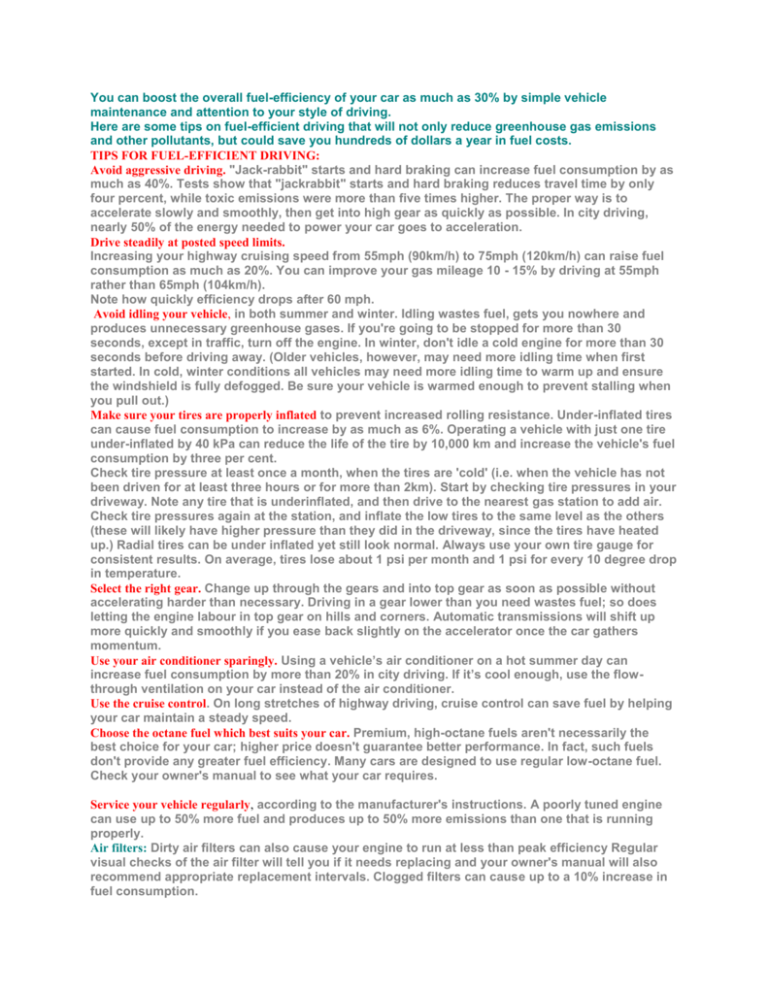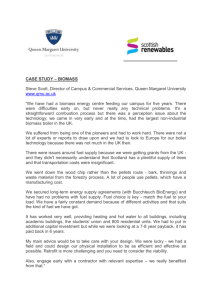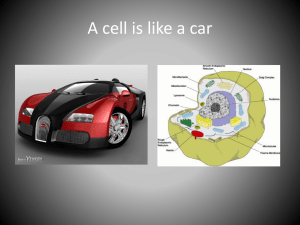You can boost the overall fuel-efficiency of your car as much as 30
advertisement

You can boost the overall fuel-efficiency of your car as much as 30% by simple vehicle maintenance and attention to your style of driving. Here are some tips on fuel-efficient driving that will not only reduce greenhouse gas emissions and other pollutants, but could save you hundreds of dollars a year in fuel costs. TIPS FOR FUEL-EFFICIENT DRIVING: Avoid aggressive driving. "Jack-rabbit" starts and hard braking can increase fuel consumption by as much as 40%. Tests show that "jackrabbit" starts and hard braking reduces travel time by only four percent, while toxic emissions were more than five times higher. The proper way is to accelerate slowly and smoothly, then get into high gear as quickly as possible. In city driving, nearly 50% of the energy needed to power your car goes to acceleration. Drive steadily at posted speed limits. Increasing your highway cruising speed from 55mph (90km/h) to 75mph (120km/h) can raise fuel consumption as much as 20%. You can improve your gas mileage 10 - 15% by driving at 55mph rather than 65mph (104km/h). Note how quickly efficiency drops after 60 mph. Avoid idling your vehicle, in both summer and winter. Idling wastes fuel, gets you nowhere and produces unnecessary greenhouse gases. If you're going to be stopped for more than 30 seconds, except in traffic, turn off the engine. In winter, don't idle a cold engine for more than 30 seconds before driving away. (Older vehicles, however, may need more idling time when first started. In cold, winter conditions all vehicles may need more idling time to warm up and ensure the windshield is fully defogged. Be sure your vehicle is warmed enough to prevent stalling when you pull out.) Make sure your tires are properly inflated to prevent increased rolling resistance. Under-inflated tires can cause fuel consumption to increase by as much as 6%. Operating a vehicle with just one tire under-inflated by 40 kPa can reduce the life of the tire by 10,000 km and increase the vehicle's fuel consumption by three per cent. Check tire pressure at least once a month, when the tires are 'cold' (i.e. when the vehicle has not been driven for at least three hours or for more than 2km). Start by checking tire pressures in your driveway. Note any tire that is underinflated, and then drive to the nearest gas station to add air. Check tire pressures again at the station, and inflate the low tires to the same level as the others (these will likely have higher pressure than they did in the driveway, since the tires have heated up.) Radial tires can be under inflated yet still look normal. Always use your own tire gauge for consistent results. On average, tires lose about 1 psi per month and 1 psi for every 10 degree drop in temperature. Select the right gear. Change up through the gears and into top gear as soon as possible without accelerating harder than necessary. Driving in a gear lower than you need wastes fuel; so does letting the engine labour in top gear on hills and corners. Automatic transmissions will shift up more quickly and smoothly if you ease back slightly on the accelerator once the car gathers momentum. Use your air conditioner sparingly. Using a vehicle’s air conditioner on a hot summer day can increase fuel consumption by more than 20% in city driving. If it’s cool enough, use the flowthrough ventilation on your car instead of the air conditioner. Use the cruise control. On long stretches of highway driving, cruise control can save fuel by helping your car maintain a steady speed. Choose the octane fuel which best suits your car. Premium, high-octane fuels aren't necessarily the best choice for your car; higher price doesn't guarantee better performance. In fact, such fuels don't provide any greater fuel efficiency. Many cars are designed to use regular low-octane fuel. Check your owner's manual to see what your car requires. Service your vehicle regularly, according to the manufacturer's instructions. A poorly tuned engine can use up to 50% more fuel and produces up to 50% more emissions than one that is running properly. Air filters: Dirty air filters can also cause your engine to run at less than peak efficiency Regular visual checks of the air filter will tell you if it needs replacing and your owner's manual will also recommend appropriate replacement intervals. Clogged filters can cause up to a 10% increase in fuel consumption. Oil: Using the correct viscosity oil is important because higher viscosity oils have greater resistance to the moving parts of the engine, and therefore use more gas. Clean oil also contributes to better gas mileage. It is usually recommended that engine oil be changed every three to five thousand miles. Monitor power accessories. Be sure to shut off all power-consuming accessories before turning off the ignition. That way, you decrease engine load the next time you start up. Items that plug into your vehicle's cigarette lighter, such as TV consoles for mini-vans and SUVs, can cause the alternator to work harder to provide electrical current. This adds a load to the engine and added load increases fuel use, decreasing your gas mileage. Think "aerodynamic" and "lightweight". Reduce drag. Out on the open highway, keep windows rolled up to reduce drag. Remove bicycle and ski racks when not in use. Excess weight also uses more fuel. Remove unnecessary items from inside the vehicle, trunk or truck bed. An extra 100lbs (48 kg) of weight can increase your fuel bill by 2%. Cold weather driving? Use a block heater when the winter temperature drops to -20°C or below. A block heater keeps your engine oil and coolant warm, which makes the vehicle easier to start and can reduce winter fuel consumption by as much as 10%. Use a timer to switch on the block heater one or two hours before you plan to drive. If you're in the market for a new car, why not purchase the most fuel-efficient model that meets your needs? In Canada, look for the EnerGuide label posted on all new cars, vans and light-duty trucks. The label provides the vehicle's fuel consumption rating and estimated annual fuel costs. If you can't find the EnerGuide label on a vehicle, ask the dealer for its fuel consumption rating. Plan your trip, whether you are going across town or across the country. Try to combine several errands in one outing, and plan your route to avoid heavy traffic areas, road construction, hilly trerrain, etc. With a little organization, you can group your "town tasks" into fewer trips, saving you time and fuel expense. Make a commitment to drive less, by walking to some nearby destinations. It's good for your health and the environment. Approximately 50% of car use is for trips within 3 miles of the home. This distance is within the range for easy biking, so it makes sense to try to use your bike for some of these short hops. You'll be saving fuel and reducing pollution, and you can also save on trips to the gym with this added exercise. Changing the oil in your car? Disposing of used motor oil by pouring it into storm or sewer drains, dumping it onto the ground, or placing it with household trash may create risks to human health and the environment. Human health is affected if rainwater carries metal-laden oil into underground streams and contaminates drinking water. It is almost impossible to clean up groundwater once it has been contaminated. Surface runoff from ground disposal and oil poured down drains often lead to water treatment plants, streams or rivers, which can also affect drinking water supplies. Used oil from a single oil change can ruin a million gallons of fresh water, a year's supply for 50 people. Pour all collected used oil into a clean, empty, sealable container such as a plastic milk jug. Specialized used oil containers can be purchased at local auto parts stores. Take it to a used oil collection site (UOCS) that accepts and recycles used motor oil. These sites, generally places such as service stations that sell motor oil, can be identified by an amber and black "Recycle Oil" logo. In the US call 1 800 CLEANUP, and in Canada call 1 800-667-4321 for the nearest used oil disposal facility. "Hi, Your site says "You can boost the overall fuel-efficiency of your car as much as 30% by ..." Make that closer to 40%. I get 72 MPG regularly, but my 2003 VW Jetta TDi's official EPA combined estimate is only 45. No custom tech, just efficient driving. And that's not pure highway driving either. My last tank was 69.9 MPG with 40% city driving. The car's efficient diesel engine helps too. Also, the Wall Street Journal mentioned a Honda Insight owner who gets 100 MPG on occasion -- that's fully 58% better than the official combined of 63 MPG". Alexander Passmoore






